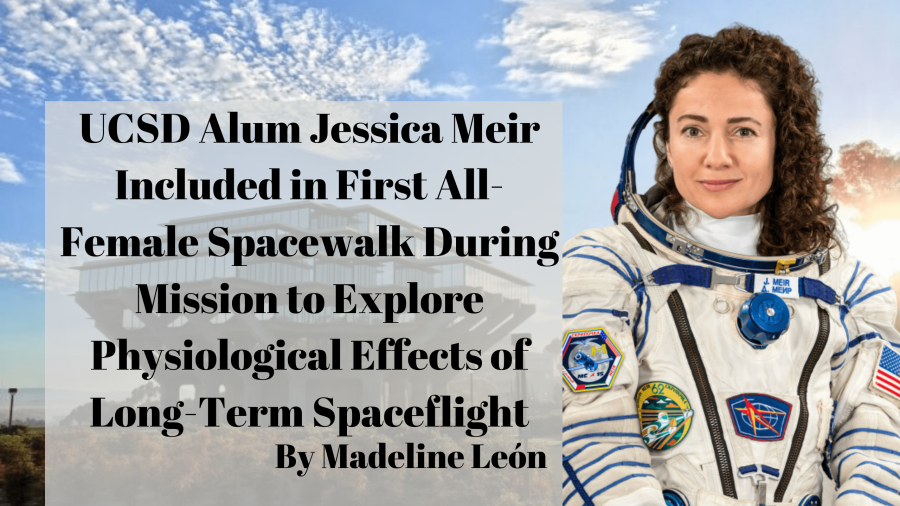UC San Diego alumna Jessica Meir joined her colleague Christina Koch in the first all-female spacewalk with the rest of their Expedition 61crew on Friday, Oct. 18. Meir and Koch went into space in order to repair a failed power unit in the International Space Station. The spacewalk commenced at 4:50 p.m. PDT and lasted for seven hours and 17 minutes.
Meir graduated from the Scripps Institution of Oceanography with a doctorate degree in Marine Biology in 2009 and became an astronaut through the National Aeronautics and Space Administration four years later in 2013. She received her bachelor’s degree in biology from Brown University and her masters degree in space studies from the International Space University.
NASA posted a blog about their spacewalk. The article states that “the two NASA astronauts completed the replacement [of] a failed power charging component, also known as a battery charge-discharge unit (BCDU).”
Gearing up for Friday’s spacewalk to help the ground teams repair one of the battery channels with @Astro_Christina.
. . . first spacesuit selfie, check!✔️
Photos will be much more spectacular once we pass through the hatch. Be sure to watch live: https://t.co/8ggAQFbzAh pic.twitter.com/oXUDnDvLLY
— Jessica Meir (@Astro_Jessica) October 16, 2019
Meir’s and Koch’s crewmembers aboard the International Space Station guided the spacewalk, European Space Agency Commander Luca Parmitano operated the robotic arm, and NASA Flight Engineer Andrew Morgan ensured the safety of their spacesuits.
While Meir and Koch took part in the first all-female spacewalk, an article by the San Diego Union-Tribune reports, “More than 225 people have performed spacewalks since the first one was carried out by a Russian in 1965.”
NASA also reported on the history of spacewalks in their blog. “Meir became the 15th woman to spacewalk, and the 14th U.S. woman. It was the 43rd spacewalk to include a woman,” NASA stated. “Women have been performing spacewalks since 1984, when Russian cosmonaut Svetlana Savitskaya spacewalked in July and NASA astronaut Kathryn Sullivan spacewalked in October.”
On Oct. 20, Meir tweeted a picture of herself in the Spacewalk. “With the support of @NASA_Johnson teams, we replaced the BCDU to bring @Space_Station power back to full capacity,” Meir tweeted. “We hope Friday’s adventure invigorates the power of all who dare to dream!”
UCSD Chancellor Pradeep Khosla commented on the alumnus’s spacewalk. “I’ve always said UC San Diego alumni are out of this world,” Khosla said, according to an article by the SDUT.
Meir and her colleagues are aboard the International Space Station studying the physiological effects of long-term space flight environments, such as the effects on the eye and retina, cardiovascular health, as well as protein crystal health in obesity, Alzheimer’s and Parkinson’s Disease. “A six-month mission is even the equivalent of about 20 years of aging on the ground,” Meir said in an article by Scripps Institution of Oceanography.
Their research will serve as beneficial for NASA’s Artemis Program. The Program will attempt to send a man and woman to the Moon’s untouched South Pole by 2024 for a long-term habitation, as well as send the first humans to Mars in the near future.
Expedition 61 will be in space for six months. The crew launched its mission in late September 2019 and are due to return in March 2020, except for Koch who will stay at the ISS for 11 months to study more in-depthly the effects of long-term spaceflight on the female body.














